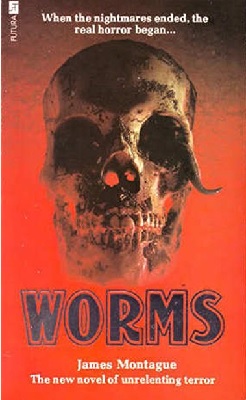Book Review: Worms by James Montague
 Worms was first published in 1979. The book is 186 pages long and the story is set on the Norfolk coast. It’s written in the first person and the central character is a man named James Hildebrand. The beginning of the book finds James and his wife on holiday. The author never provides James’s wife with a name. It’s a strange omission to make, but she’s not in the story for long.
Worms was first published in 1979. The book is 186 pages long and the story is set on the Norfolk coast. It’s written in the first person and the central character is a man named James Hildebrand. The beginning of the book finds James and his wife on holiday. The author never provides James’s wife with a name. It’s a strange omission to make, but she’s not in the story for long.
James and his wife originally rented a cabin cruiser, with the intention of travelling the Norfolk Broads, but the ancient cruiser was less than comfortable and its engine gave them several days of trouble before giving up for good. James considered the death of the engine to be a blessing in disguise and when the owner of the boat gave the Hildebrands a refund it was the icing on the cake and James booked a room at a coastal inn instead.
James’ wife has little enthusiasm for this attempt to salvage their holiday. She would have preferred to return to their flat in London. In fact, the lady seems determined not to enjoy herself and equally adamant James will not enjoy himself either. James’ wife does not come across as one of the nicest people in the world, but the reader soon discovers James is not ideal partner himself and, in all honesty, not much of a human being either.
Despite his wife’s best (or worst) efforts James takes an instant liking to the area, decides that he would like to live there, and begins looking at property. He does this behind his wife’s back and his deceptive behaviour is made all the worse by the fact that he has no money of his own and is planning on using his wife’s inheritance. Nice guy!
James soon finds his ideal home but is unable to convince his wife to buy it. She hates the place. Not a man to let a little thing like that stop him, James decides on another option and murders his wife in chapter three. Chapter four is set six months later and finds him living in his ideal home. Only two things spoil his new found happiness:
- James is convinced that the local gardener knows the truth about his wife’s death.
- The local worm population seem to have unusually aggressive tendencies.
In all honesty, I have to say that I did not enjoy Worms. When I review a book I read it first and then work my way through it again as I am writing. If the book is so bad I cannot finish the first reading, I do not review it. To its credit, I did manage to finish Worms, but my main reason for finishing the book was because I wanted to discover the reason for the worms’ strange behaviour.
In the first chapter James visits the local church, where he spots two life-size effigies, lying side by side on their tombs, with what James presumes are snakes writhing up towards them. They are not snakes. The vicar informs him they are “The worms of Hell” and they, “Rear in pursuit of the souls of the deceased.” A statement like this hints a supernatural connection, as does the fact that church suddenly becomes unnaturally cold. Even the vicar appears to be uncomfortable in there.
Towards the end of the first chapter, James visits the local estate agent, who is about to go fishing and manages to spill his tin of worms onto the floor. The worms rear up like snakes and then begin burying themselves in the carpet. The estate agent recovers as many worms as he can and then begins to stamp on the carpet. “They are little devils,” he says. “They make marvelous bait, but you don’t want to let them escape.” Again, the hint is there, something is decidedly odd about these worms. I had to find out what. I was to be disappointed.
The worms turn up in the story again and again and, at times, behave in a manner that shows intelligence. Worse still, the worms seem to have an agenda. Later on in the book though, the storyline deviates and goes off in a totally different direction when the government builds a nuclear power station on the moors. First, the worms vanish and then when they return the worms have turned nasty. Worms with attitude? Okay, I can just about take that, but what really annoys me is the change in direction. The author suddenly discards any association with the supernatural and puts everything down to radiation! How could he justify this? These were bad-ass worms before the power station put in an appearance! I even thought that they might be the worms of Hell. Radioactive wrigglers just doesn’t do it for me.
There are a few surprises at the end of the book but, as far as the worms go, no real answers and I felt incredibly let down. It was hard to like any of the characters in this story and even harder to feel any sympathy for them, but I stuck with them until the bitter end. I wish I’d dug up some worms of my own. I could have gone fishing instead.
If the idea of killer worms appeals to you, I suggest you consider reading Squirm instead. It’s not the greatest book either, but it’s certainly better than Worms.
